Islamic State in a Wednesday statement claimed its fighters killed 25 soldiers in an assault on a military base in Benisheikh in northeast Nigeria’s Borno state.
ISIS said fighters from its West Africa Province affiliate attacked the Nigerian Army base in Benisheikh on Monday, July 29. It claimed that around 25 soldiers were killed and others injured in clashes that lasted several hours, after which the insurgents seized weapons and ammunition, and burned the base.
The Nigerian military has not yet commented on the incident, but there were multiple reports of insurgent activity in the Benisheikh area.
Sahara Reporters Tuesday reported that Benisheikh was attacked at 6 p.m. local time on Monday, but that the assault was repelled by troops with air support. The Daily Post reported the attack began at 6:40 p.m., and that soldiers and an attack helicopter fought the insurgents off.
There were also reports of a Monday attack in Bama, around 70 km (43 miles) southeast of Maiduguri, and the regional counter-insurgency Multinational Joint Task Force said that one soldier was killed and five were injured in an ISWAP attack near Baga, further east in the Lake Chad area. The MNJTF said 10 militants were killed.
In a second Wednesday statement, ISIS said ISWAP fighters on Monday clashed for several hours with soldiers “at a site where members of the Nigerian army were gathered” at Mile 4, which is near Baga. It claimed more than 15 troops were killed and others were wounded.
This week marks 10 years since the Islamist insurgency in northeast Nigeria began, and the series of attacks in Borno state came on the eve of the 10th anniversary of the death in police custody of Boko Haram founder Muhammad Yusuf. On Tuesday evening, a spokesperson for President Muhammadu Buhari again insisted that Boko Haram was defeated, blaming ongoing violence in the northeast on international jihadists exploiting porous borders with Sahel countries.
Uptick in attacks between Maiduguri and Damaturu
Benisheikh, also spelled Benisheik, is around 70 km west of Borno state capital Maiduguri. It is on the 120-km Maiduguri-Damaturu road, which has seen repeated attacks on military bases and markets in villages in recent weeks.
ISIS-claimed attacks in the Maiduguri area, previously dominated by the Shekau-led Boko Haram faction, have been concentrated on military bases north of the state capital, although there has also been an uptick in ISWAP attacks on bases south of Maiduguri.
On July 17, ISWAP fighters attacked the nearby military base at Jakana, and ambushed a military vehicle on the road. The outcome and timeline of the assault and ambush are unclear, but at least four soldiers including a colonel were killed in the ambush, which the military confirmed was near Benisheikh. The assault on Jakana, around 30 km east of Benisheikh, was repelled, the military said.
ISWAP has repeatedly carried out attacks in the area in recent months and Nigeria’s military has, at times, accused civilians of assisting the insurgents.
In early December, three civilians were killed during clashes between Nigerian soldiers and ISWAP militants in Jakana.
In January, ISWAP reportedly sent letters to residents of Jakana and nearby Mainok telling them to vacate their homes ahead of an impending raid on the military.
ISIS claimed ISWAP fighters on April 5 clashed with the Nigerian army in Jakana and Mainok, killing and injuring an unspecified number and destroying six vehicles.
On April 8, up to 10,000 residents of Jakana were moved to an IDP camp in Maiduguri without “time to collect personal belongings,” the United Nations said.
A Nigerian Army spokesperson later said that the relocation was related to intensive multi-nation operations against insurgents around Lake Chad, 150 km further northeast, but the Guardian reported a military source as saying the people of Jakana were suspected of “conspiring with Boko Haram.” A Punch source repeated the allegation, saying that the insurgents come to Jakana “with agreement that they will not attack the town” or kill any of its people, and that they allow “the insurgents to freely come in and make purchases from shops.”
Residents were allowed to start returning to Jakana on April 11, the U.N. Office for the Coordination of Humanitarian Affairs said.
On July 19, PRNigeria report also alleged that people in the area were offering succour to insurgents, saying without revealing its sources that communities including Matari, Mada, Burgozo, Duwari, and Didiri aid, support and offer help to “extremists.”
ISWAP in Nigeria
The jihadist group known as Boko Haram began its bloody insurgency in northeastern Nigeria in 2009, but it has since spread into neighboring Niger, Chad and Cameroon, prompting a regional military response. More than 27,000 people have been killed and two million others displaced, sparking a dire humanitarian crisis in the region. The U.S. assesses that Boko Haram and ISWAP have been responsible for over 35,000 deaths since 2011.
Boko Haram split into two factions in mid-2016. One, led by long-time leader Abubakar Shekau, is notorious for suicide bombings and indiscriminate killings of civilians. Shekau pledged allegiance to ISIS leader Abu Bakr Al-Baghdadi in March 2015, but ISIS central only gives formal backing to the other faction, which it calls Islamic State West Africa Province.
The ISWAP faction, which largely focuses on attacking military and government targets, was led by Abu Mus’ab Al-Barnawi, but in March, audio recordings revealed that ISIS appointed Abu Abdullah Idris bin Umar, also known as Ibn Umar al-Barnawi, as leader. Despite releasing several videos featuring ISWAP since, ISIS has not yet made a public statement confirming the change.
Since May, Islamic State has attributed insurgent activities in the Mali-Burkina Faso-Niger tri-border area to its West Africa Province affiliate, rather than to what was previously known as Islamic State in the Greater Sahara. In a June 15 ISIS propaganda video, ISWAP militants purportedly in Nigeria, Mali and Burkina Faso were shown reaffirming their pledge of allegiance to ISIS leader Baghdadi.
The MNJTF which comprises personnel from Chad, Cameroon, Niger, and Nigeria, launched Operation Yancin Tafki on February 21 to battle the insurgents. It has said the cross-border operation is aimed at “making islands and other settlements in Lake Chad untenable for Boko Haram Terrorists.”


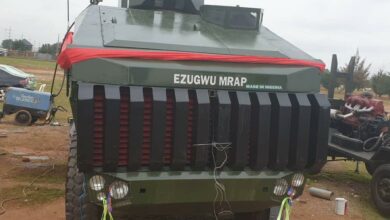

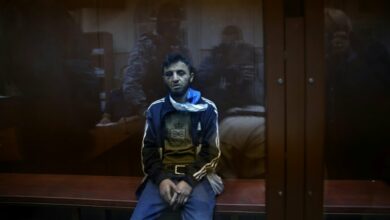


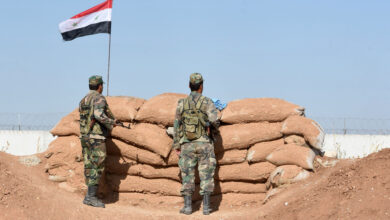
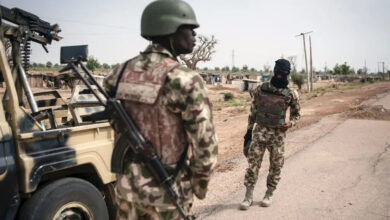
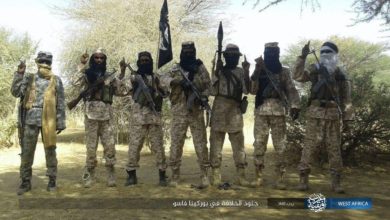

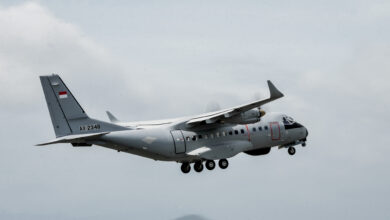
4 Comments